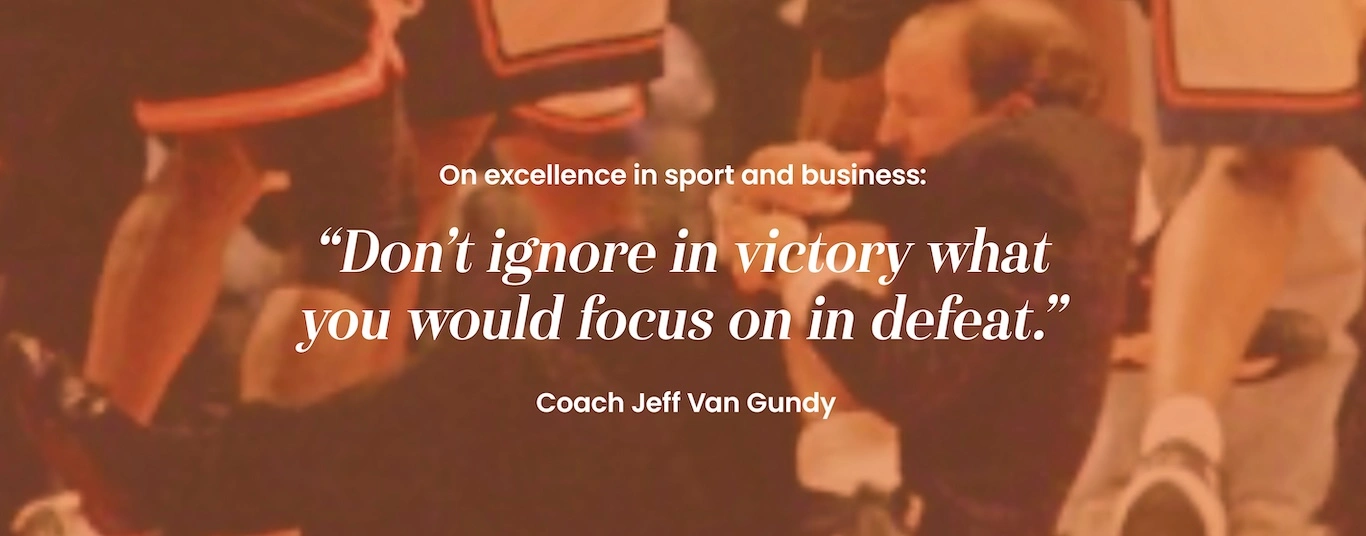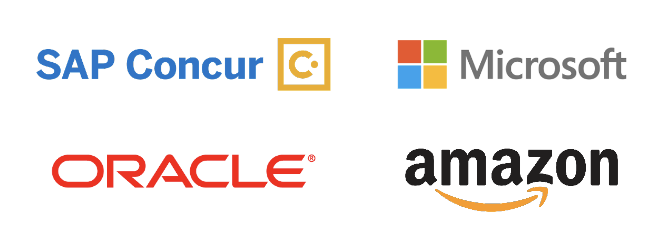
In the basketball world, Jeff Van Gundy was known as a hard-nosed, team-first coach. His passionate, animated antics cemented his reputation just as much as his coaching record. An outsized personality was merely a small piece of his larger approach, centered around intent, accountability, and transparency. One famed quote of his continues to resonate with me: “Don’t ignore in victory what you would focus on in defeat.”
This principle extends far beyond the sports world. It offers a winning mindset for leadership and organizational excellence – both in business and beyond.
Learning from Sports: The Value of Self-Examination
In professional sports, winning teams never skip film review. After each game, they meticulously analyze both successes and failures, asking: What went right? What went wrong? Why did certain plays succeed or fail? But, strangely, this is rarely utilized in the business world.
When examining victories—whether a successful product launch, exceeded sales targets, or operational efficiencies—companies should consider: What specific factors contributed to this success? Can these elements be systematized? Are there aspects of even our best performances that could be enhanced?
Just as athletes review game footage frame-by-frame, businesses should deconstruct their wins to identify replicable patterns and hidden opportunities for improvement. This disciplined approach to success prevents complacency and forms a foundation for sustained excellence rather than fleeting victories.
Why Even Successful Companies Need Consulting
This extends to my sport – consulting. Companies usually turn to consultants when they’re in the middle of a crisis. The symptoms are often familiar: rising costs, declining sales, missed deadlines, supply chain disruptions, and more. In these moments, consultants act as emergency responders, bringing fresh perspectives and expertise to help stabilize the situation.
But this approach differs for successful companies far too often. Good fortune can give the illusion of permanence, warping a firm’s preparedness and resulting in a suboptimal approach for the future. In these seemingly ideal circumstances, forward-thinking leaders recognize untapped potential. For me, this is where Van Gundy’s philosophy becomes especially relevant.
Just as great teams benefit from specialized coaches, successful businesses can gain value from outside perspectives. Forward-thinking companies are utilizing this approach by redefining how they engage with consultants.
Instead of viewing consultants solely as problem-solvers for struggling operations, businesses should utilize them as performance coaches, helping to analyze big wins and reach even greater heights. This approach promotes a more proactive culture and maintains momentum during successful periods. Firms that have embraced this approach include:
- Toyota, which regularly brings in outside experts to evaluate their decades-long, industry-leading production system.
- Microsoft, utilizing consultants to help expand cloud services offerings—despite already being at all-time profitability levels.
- Starbucks, employs consultants to reimagine their customer experience during periods of strong financial performance.
Not Just Headlines but A Personal Experience with a Small Business
A few years ago, I saw this firsthand with a manufacturing client. After a six-month engagement in which we helped optimize their production processes, they achieved impressive results:
- 22% reduction in cycle time by improving maintenance practices and focusing on OEE (Overall Equipment Effectiveness) a KPI that measures how effectively a manufacturing operation is utilizing its resources.
- 15% improvement in first-pass quality – a manufacturing metric that measures the percentage of products that meet quality standards the first time they are produced, without needing rework or repairs.
- 30% decrease in work-in-progress inventory, the cost of partially completed goods in the production cycle, between raw materials and finished goods.
During our last few weeks with the client, they asked about maintaining momentum after our approaching departure. Immediately, I thought of Coach Van Gundy’s quote and shared it with the leadership team. We then established a quarterly “success review” process where teams would critically examine their best-performing areas—not just problem spots—to identify further optimization opportunities.
Fast forward two years later, and the client continues to improve all key metrics without experiencing any performance plateaus that typically follow consulting engagements. That’s a slam dunk.
Navigating Today
In today’s constantly changing environment, this proactive approach has become all the more critical. Companies face unprecedented challenges, such as shifting political dynamics, shifting trade relationships between major economies, and significant changes in government spending priorities.
Even the biggest firms are not immune to these macro-economic pressures. Market leaders across sectors—from technology to manufacturing—find themselves navigating an environment where yesterday’s winning strategy could become tomorrow’s liability. As the saying goes, ‘The time to repair the roof is when the sun is shining’.
This mindset shift – from problem-solving to excellence-seeking – fundamentally transforms how organizations approach improvement. It’s about maintaining the same rigorous analysis and attention to detail during periods of success that would naturally emerge during crisis.
The key to sustainable success isn’t just about fixing what’s broken – it’s about maintaining the same level of scrutiny and search for improvement. By embracing consultants as partners in excellence rather than just problem-solvers, successful companies can stay ahead of market shifts, continuously improve their operations, and maintain their competitive advantage in an increasingly complex business environment.
How does your company respond to success? Are you reviewing the metaphorical film from your recent wins? If not, I would love to talk to you about how my team at alliantConsulting can implement a championship mentality of continuous improvement.

With over a decade of experience in supply chain management and consulting across various industries, Oliver is dedicated to driving meaningful change and process improvements. His passion lies in enhancing company operations and positively impacting the workforce. Oliver excels in defining problems and communicating solutions clearly, leveraging his strong analytical skills. His global experience spans multiple continents and cultures, enabling him to deliver results in diverse environments. Focused on project management, he identifies the right tools, processes, and metrics to implement sustainable solutions that enhance clients’ bottom lines.

Joy Taylor is a Managing Director with alliantConsulting. As a visionary leader and proven change management expert, she isn’t just a consultant; she’s a force of nature in the world of business transformation. With over twenty-five years of cross-functional experience, Joy applied her expertise in program transformations, project leadership, strategy and execution, team facilitation, change management, communication, and Lean Sigma to everything from startups to multibillion-dollar enterprises. Her impressive track record speaks volumes, but her accolades and career milestones set her apart as a critical advisor for CEOs.










